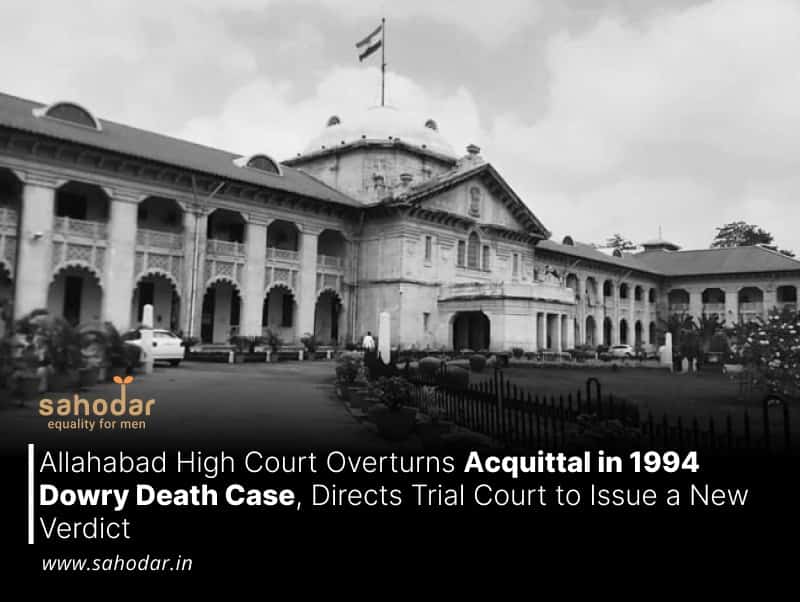In the case dating back to 1994, the accused were acquitted by the trial court in 1998. A revision plea against the acquittal order was filed in 1998 itself and disposed of on December 7, 2023.
After a span of twenty-nine years since the reported death of a 22-year-old woman in her marital residence, the Allahabad High Court has overturned the acquittal of the accused individuals. The court has instructed the trial court to issue new rulings for the case, identified as Kharakh Singh v. Krishan Pal And Others.
Justice Umesh Chandra Sharma asserted that the trial court had misinterpreted the evidence, leading to an inaccurate decision in its acquittal verdict from 1998. The High Court determined that there was irrefutable evidence supporting the occurrence of an unnatural death within two years of marriage. Consequently, it issued the following directive.
“The Additional Sessions Judge-IV, Meerut, is directed to hear both the parties and again pass appropriate orders in accordance with law within three months on the basis of evidence available on the record and in light of the observations made in this judgment.”
The dowry death case, which has seen its acquittal overturned by the High Court, was officially registered on March 1, 1994.
According to the complainant, Kharak Singh, his daughter Anita, who had been married in 1992, was allegedly murdered by her in-laws after enduring persistent harassment for dowry.
Despite being acquitted in 1998, the accused faced a criminal revision petition that same year from the victim’s father.
Upon scrutinizing the evidence, the High Court identified several flaws in the trial court’s decision. Notably, it observed that the victim’s death was attributed to a combination of alcohol and insecticide.
In light of this, the Court expressed the opinion that had the victim self-administered the poison, an empty bottle or pouch would have been discovered. Since no such item was recovered, the Court inferred that these substances were likely administered by others and the container subsequently removed from the scene.
Dismissing the defense’s assertion of natural causes for the woman’s death, the Court emphasized the presence of contusions on her body and highlighted her overall good health with no history of disease.
“The deceased had died in the house of the accused persons and it has also been proved from the evidence that accused persons had left their house and fled away. Hence, a burden under section 106 of the Evidence Act would also arise upon the accused persons to explain the facts especially in their knowledge as to how only a 22 years young and healthy bride died of unnatural death,” the Court added.Top of Form
The Court further argued that the accused, by failing to inform anyone about the incident and leaving the victim’s dead body unattended, raised suspicions against them.
Additionally, the Court pointed out that there was no evidence demonstrating the accused or any of their relatives taking part in the deceased’s last rites.
Addressing the trial court’s determination that the inquest was not conducted by the designated Deputy Superintendent of Police, the Court expressed the view that, in cases of dowry death, it is typically the responsibility of the Sub Divisional Magistrate (SDM), Tehsildar, Naib-Tehsildar, or any Executive Officer to oversee the inquest in the presence of the police.
“If the inquest report was prepared by the concerned SDM, it is not going to disprove the inquest report or its procedure,” the Court held.
The Court expressed its disagreement with the trial court’s perspective, which asserted that no dowry demand could have been made since none was articulated at the time of the marriage. Justice Sharma deemed this belief to be incorrect, stating that demands for dowry could occur before, during, or after the marriage.
In the final analysis, the Court determined that the victim had met an unnatural demise due to injury and poison. It emphasized that the responsibility to counter the presumption of a dowry demand lies with the defense, a burden that the accused have failed to discharge.
“Section 106 [of Indian Evidence Act] casts duty to discharge the burden and explain the facts especially within the knowledge of the in-laws as to how the bride died. If the accused does not throw light on a fact which is within his knowledge his failure to offer any explanation would become a strong militating circumstance against him,” the Court held.
Against this background, the Court granted the revision petition challenging the acquittal and annulled the judgment of the trial court. The Court instructed the trial court to issue a new order in light of this decision.

